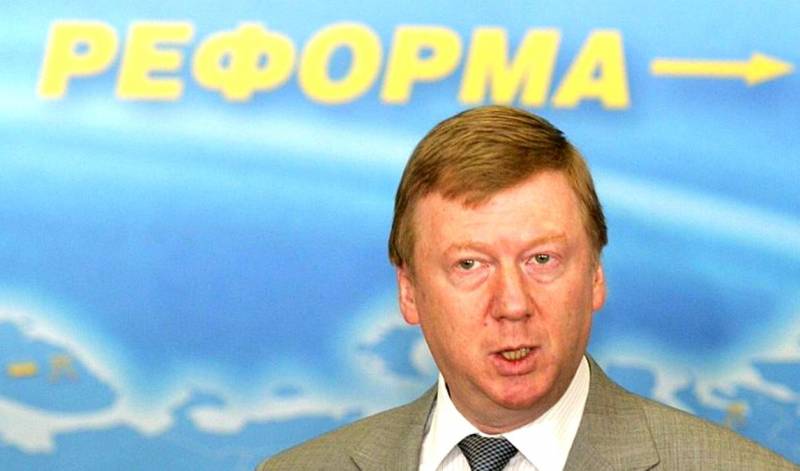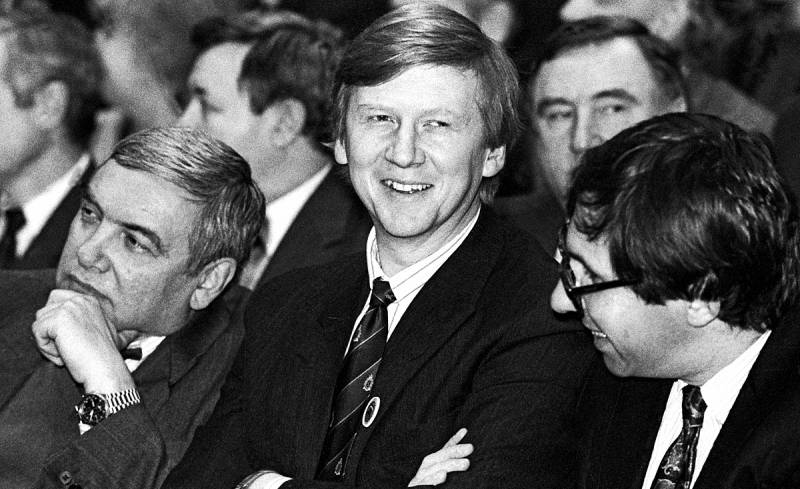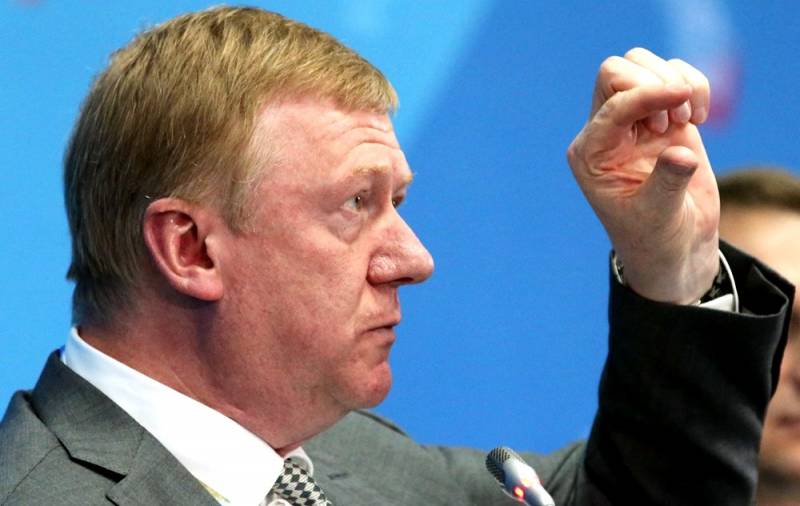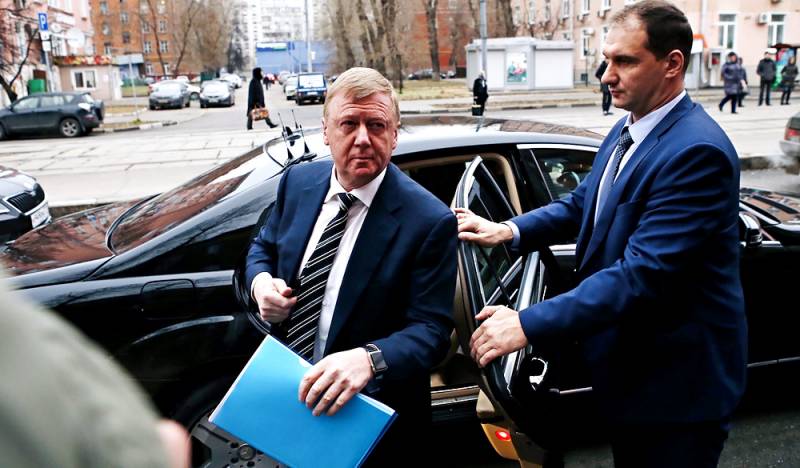Chubais. The story of a betrayal
In any country with a market the economy the initial accumulation of capital occurred in a criminal way. And Russia is no exception. The privatization carried out in the 90s by the so-called “young reformers” laid the foundation of the modern Russian economy, contributed to the emergence in our country of the first large capital and the emergence of a class of oligarchs.
Western trace of Russian privatization
When they talk about the privatization of state property in Russia, they definitely remember Anatoly Chubais. According to him, he did not start these reforms, privatization has spontaneously been taking place in the country since the end of the 80s. He simply directed her into a "civilized channel."
But here is a fact that is alarming. According to Vladimir Putin, he said at a press conference in 2013, among the advisers to Anatoly Borisovich were CIA officers.
Commenting on this statement, Chubais expressed his extreme surprise, saying the following:
Something reminds one of the characters of Misha Galustyan, who fearfully repeats: “Guys, I don’t know!”.
Some of the representatives of American intelligence from the team of Anatoly Borisovich, who were too keen on the privatization process and made decent fortunes in Russia, were judged upon returning home according to US laws prohibiting civil servants from engaging in commercial activities.
Secrets of Privatization
Information about the criminal aspects of privatization was first published in 1998 in the Top Secret newspaper, but over the past twenty years it has not lost its relevance. Many names were revealed in the article, a large array of specific numbers was given, and none of the defendants was indignant and did not argue with the author's conclusions.
A large-scale transfer of state property to private hands began in the summer of 1992, when Anatoly Chubais received the position of Deputy Prime Minister of the Russian Federation. In his work, he relied on the January presidential decree No. 66. It spoke of the beginning of privatization in order to increase the efficiency of enterprises. In fact, the overall level of production from 1992 to 1996 fell by more than half.
How to pull the defense
The sale of state-owned enterprises took place at an increasing pace, so that by 1995 more than half of state property fell into private hands. Among the new owners there were many foreigners. They were especially interested in defense enterprises. Strategic and defense enterprises were dismantled like hot cakes.
For example, the American company Nick & Sea Corporation bought back large blocks of shares in the following enterprises: Kursk Pribor JSC, Rubin JSC, Avionika JSC, Tushinsky Machine-Building Plant and some others.
And in many strategic industries, co-owned by the state, they reduced the share of state property and sold large blocks of shares to private owners.
Often, preference was given to foreign buyers. For example, when a unique enterprise of JSC Energia, which was of strategic importance for the country, was sold at auction, not a single domestic bidder was allowed to bid. Only representatives of foreign companies were present.
Russian special services drew the attention of the leadership to the danger of such actions, but ignored their appeals. In 1994, the Foreign Intelligence Service, together with the FSB, sent a report to the country's leaders saying the following:
This appeal was ignored.
Most surprisingly, at such rates of privatization, income from it amounted to only 0,13-0,16 percent of all budget revenues. Where the rest of the funds went - we can only guess.
Where did the money go?
The main managers at this “celebration of life” were two organizations through which clever “privatizers” carried out their activities: the State Property Committee and the Russian Federal Property Fund. The proceeds they had to pour in a powerful stream to the state budget, solve all the country's economic problems and make Russians rich and happy.
But not so simple. As it turned out, privatization is not only a complicated process, but also very costly. And so much so that only miserable crumbs fell into the budget. No need to think that the funds were stolen. They just spent on organizing the process. This can be understood from the surviving reports.
For example, the average salary of employees of the State Property Committee was 800 thousand rubles, while the average salary in the country was 300 thousand. Moreover, in addition they received 1994 salaries in 12, and 1995 in 19.
In addition, to fulfill their tasks, the privatization company spent round sums. For example, consumables took 5 billion rubles, which at that time was about one million dollars. 1,7 billion (300 thousand US dollars) were spent on transportation services. It took 489 million rubles to carry out various events, including accommodation in hotels with three meals a day. To congratulate the anniversaries, they bought flowers in the amount of 685 thousand. But the item of expenses was especially pleased - the purchase of shoe laces for 130 thousand.
One of the employees then joked about this, that they shod the whole country, and now they are also getting lace up.
The expenses for the needs of the organization were so great that the money from the sale of enterprises was sorely lacking. Anatoly Chubais and Yegor Gaidar even had to take an irrevocable loan in the amount of one million 37 thousand dollars. He, too, somewhere “resolved,” probably into pins.
In general, there is no money, but privatization was successful.
Today, Anatoly Borisovich Chubais continues to work, managing the company Rusnano. Now, even if the facts of his illegal actions are proved, he is not in danger, since all the statutes of limitations have passed.
Perhaps now it was decided to use his energy for peaceful purposes, not allowing him to enter the financial sphere. And in the field of high technology, he is able to bring Russia to new frontiers, with maximum effort and the enormous leadership experience. The main thing is to be supervised.
Western trace of Russian privatization
When they talk about the privatization of state property in Russia, they definitely remember Anatoly Chubais. According to him, he did not start these reforms, privatization has spontaneously been taking place in the country since the end of the 80s. He simply directed her into a "civilized channel."
But here is a fact that is alarming. According to Vladimir Putin, he said at a press conference in 2013, among the advisers to Anatoly Borisovich were CIA officers.
Commenting on this statement, Chubais expressed his extreme surprise, saying the following:
I have heard this information many times and, frankly, treated it like rumors. But if the president of Russia says this, then it is serious.
Something reminds one of the characters of Misha Galustyan, who fearfully repeats: “Guys, I don’t know!”.
Some of the representatives of American intelligence from the team of Anatoly Borisovich, who were too keen on the privatization process and made decent fortunes in Russia, were judged upon returning home according to US laws prohibiting civil servants from engaging in commercial activities.
Secrets of Privatization
Information about the criminal aspects of privatization was first published in 1998 in the Top Secret newspaper, but over the past twenty years it has not lost its relevance. Many names were revealed in the article, a large array of specific numbers was given, and none of the defendants was indignant and did not argue with the author's conclusions.
A large-scale transfer of state property to private hands began in the summer of 1992, when Anatoly Chubais received the position of Deputy Prime Minister of the Russian Federation. In his work, he relied on the January presidential decree No. 66. It spoke of the beginning of privatization in order to increase the efficiency of enterprises. In fact, the overall level of production from 1992 to 1996 fell by more than half.
How to pull the defense
The sale of state-owned enterprises took place at an increasing pace, so that by 1995 more than half of state property fell into private hands. Among the new owners there were many foreigners. They were especially interested in defense enterprises. Strategic and defense enterprises were dismantled like hot cakes.
For example, the American company Nick & Sea Corporation bought back large blocks of shares in the following enterprises: Kursk Pribor JSC, Rubin JSC, Avionika JSC, Tushinsky Machine-Building Plant and some others.
And in many strategic industries, co-owned by the state, they reduced the share of state property and sold large blocks of shares to private owners.
Often, preference was given to foreign buyers. For example, when a unique enterprise of JSC Energia, which was of strategic importance for the country, was sold at auction, not a single domestic bidder was allowed to bid. Only representatives of foreign companies were present.
Russian special services drew the attention of the leadership to the danger of such actions, but ignored their appeals. In 1994, the Foreign Intelligence Service, together with the FSB, sent a report to the country's leaders saying the following:
Privatization of enterprises of the military-industrial complex led to a massive leak of the latest of technologies, unique scientific and technological achievements practically for nothing to the West. On the whole, the West acquired in Russia such a large volume of new technologies that NATO established a special program for their processing.
This appeal was ignored.
Most surprisingly, at such rates of privatization, income from it amounted to only 0,13-0,16 percent of all budget revenues. Where the rest of the funds went - we can only guess.
Where did the money go?
The main managers at this “celebration of life” were two organizations through which clever “privatizers” carried out their activities: the State Property Committee and the Russian Federal Property Fund. The proceeds they had to pour in a powerful stream to the state budget, solve all the country's economic problems and make Russians rich and happy.
But not so simple. As it turned out, privatization is not only a complicated process, but also very costly. And so much so that only miserable crumbs fell into the budget. No need to think that the funds were stolen. They just spent on organizing the process. This can be understood from the surviving reports.
For example, the average salary of employees of the State Property Committee was 800 thousand rubles, while the average salary in the country was 300 thousand. Moreover, in addition they received 1994 salaries in 12, and 1995 in 19.
In addition, to fulfill their tasks, the privatization company spent round sums. For example, consumables took 5 billion rubles, which at that time was about one million dollars. 1,7 billion (300 thousand US dollars) were spent on transportation services. It took 489 million rubles to carry out various events, including accommodation in hotels with three meals a day. To congratulate the anniversaries, they bought flowers in the amount of 685 thousand. But the item of expenses was especially pleased - the purchase of shoe laces for 130 thousand.
One of the employees then joked about this, that they shod the whole country, and now they are also getting lace up.
The expenses for the needs of the organization were so great that the money from the sale of enterprises was sorely lacking. Anatoly Chubais and Yegor Gaidar even had to take an irrevocable loan in the amount of one million 37 thousand dollars. He, too, somewhere “resolved,” probably into pins.
In general, there is no money, but privatization was successful.
Today, Anatoly Borisovich Chubais continues to work, managing the company Rusnano. Now, even if the facts of his illegal actions are proved, he is not in danger, since all the statutes of limitations have passed.
Perhaps now it was decided to use his energy for peaceful purposes, not allowing him to enter the financial sphere. And in the field of high technology, he is able to bring Russia to new frontiers, with maximum effort and the enormous leadership experience. The main thing is to be supervised.
- Sergey Kuzmitsky
- http://tass.ru/




Information